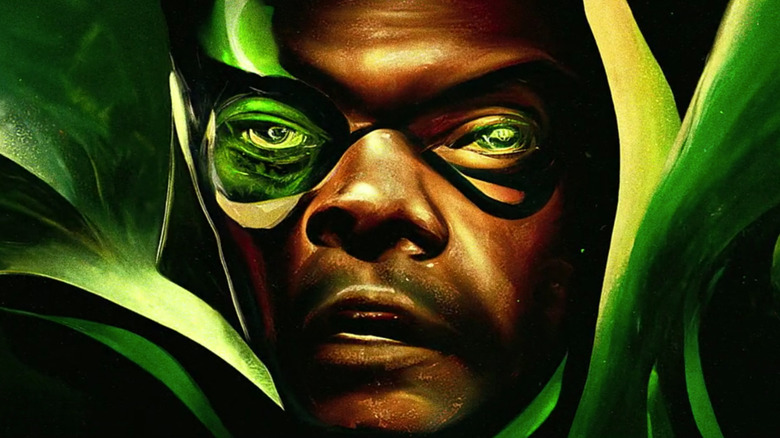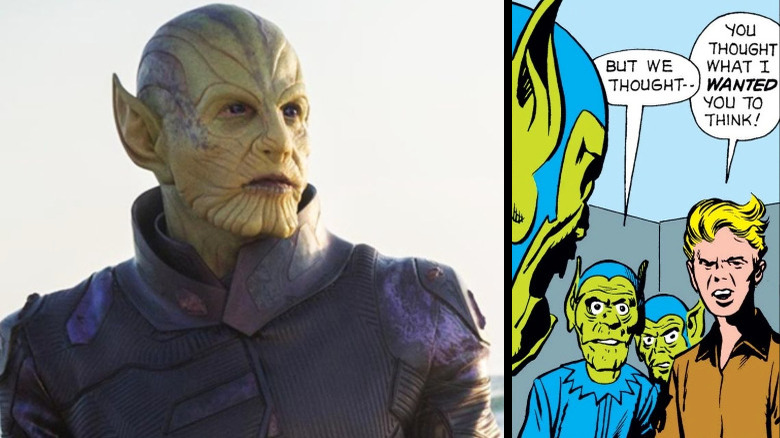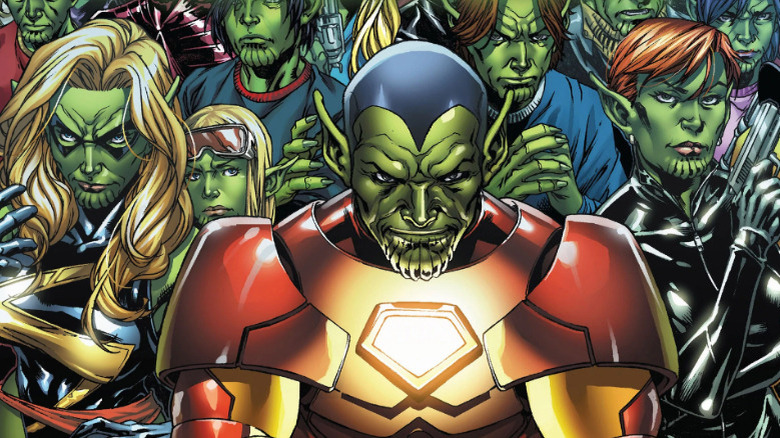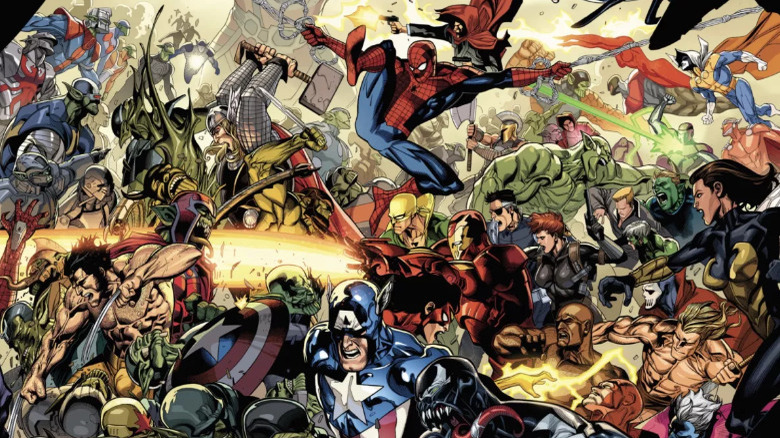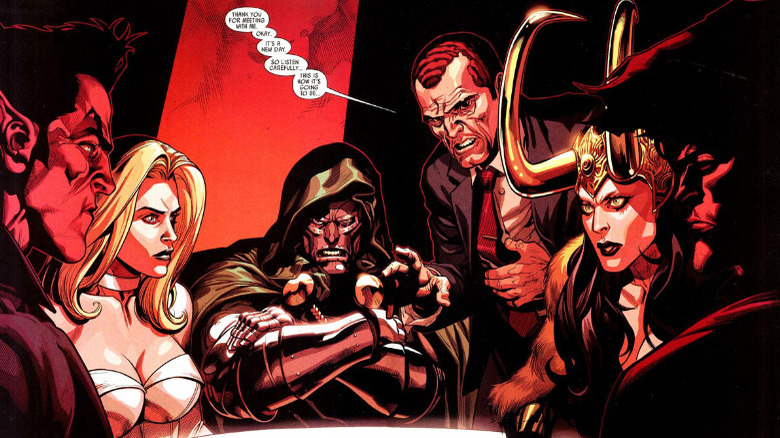How Marvel's Secret Invasion Compares To (And Changes) The Original Comic
Give the Marvel Cinematic Universe enough time and it'll probably adapt every single major comic book crossover ever, even the weird ones like "One Nation Under Doom," where Doctor Doom tried to become the President of the United States in the future, or "The Mys-Tech Wars," which I couldn't explain to you if I had all day.
But some of the major Marvel crossovers make sense for the MCU, and heaven knows "Secret Invasion" is one of them. The existence of an entire species of shapeshifting aliens raises a lot of storytelling possibilities, and the potential for Earth to be completely invaded without our knowledge is a Tom Clancy-esque paranoid conspiracy thriller just waiting to happen.
At least, that's how the MCU is tackling "Secret Invasion," in a streaming television series modeled after the sagas of Jack Bauer, Jack Ryan, and probably some other Jacks. But in Marvel Comics, "Secret Invasion" went down very, very differently. Let's take a look at what Marvel Studios is pulling from, and how far afield we already are from the original, epic superhero throwdown.
Very different Skrulls
Skrulls may look the same in Marvel Comics and the Marvel Cinematic Universe, but they weren't introduced that way. The Skrullos natives, who are green with pointy ears and a ridged chin in their natural form, date back all the way to "Fantastic Four #2" (1961), one of the first superhero comics of Marvel's Silver Age. The Skrulls impersonated the Fantastic Four and framed them for crimes, and in retaliation, the Fantastic Four transformed them into cows and hypnotized them into thinking they are real cows, which is incredibly messed up and sure enough, in "Secret Invasion," the Skrulls are still pretty mad about it.
Indeed, the Skrulls in the Marvel Comics were a near-constant thorn in Earth's mightiest heroes' collective side, having caused a ruckus of one form or another throughout the storied history of the comic book universe. There were sympathetic Skrulls — Johnny Storm even married one, although he thought she was The Thing's ex-girlfriend at the time (look, it's complicated) — but they were largely introduced as villains and largely stayed that way.
In contrast, the Skrulls in the MCU were introduced as misunderstood victims of the Kree. Captain Marvel was convinced that the Skrulls were her enemies in her self-titled solo feature, only to discover that they weren't that bad at all, and were merely doing whatever they had to do to survive after their home world was destroyed following the Kree–Skrull War. Captain Marvel and Nick Fury vowed to find the Skrulls a new home for their people, and in exchange, they've done some work together over the years.
In short, the "Secret Invasion" in the comics was a natural extension of the Skrull's longstanding villainy. The "Secret Invasion" in the MCU comes as a bit of a surprise (or at least it does to Nick Fury).
Very different Marvel Universe
The Marvel Universe of the comics is very different from the Marvel Cinematic Universe. For one thing, there's a whole lot more of it, with enough superheroes and villains to populate a small city, and the sheer volume of their adventures would take a heck of a lot longer to sort through than it would to watch all the MCU movies, even if there are now more than 30 of them.
So while the Skrulls in MCU's "Secret Invasion" seem content to impersonate secret agents and the like, the Skrulls in the comics version were much more focused on impersonating superheroes and their closest associates. Some of the prominent Marvel characters who had, for a pretty long time, been impersonated by Skrulls included Hank Pym and Contessa Valentina Allegra de la Fontaine, and could theoretically turn out to be imposters in the series.
But other heroes impersonated by Skrulls are less likely to turn up, since they aren't in the MCU proper right now, like Spider-Woman, Elektra, or the original Captain Marvel. Others, like Jarvis the (human) butler and Dum Dum Dugan, were part of the MCU — but they were alive and kicking in the mid-20th century, and hence, probably aren't around anymore.
It's also worth remembering that in the comics, "Secret Invasion" came shortly after the "Civil War" between Iron Man and Captain America that destabilized the whole superhero community. That's not so much the case here in the MCU, where even the intergalactic tragedy known as "The Blip" is already starting to feel more like a history lesson than a recent event.
Very different scale
The Marvel Cinematic Universe TV shows may be fun, and some of them may even be great, but they're not all as expensive as their theatrically released counterparts. "Secret Invasion" seems to be no exception. Whether you're digging it or not, it's definitely more on the scale of a network TV spy series than a major Hollywood blockbuster.
Compare that to the original comic book mini-series and you'll find that "Secret Invasion" is about as huge as Marvel Comics gets. It's a globe-trotting adventure that sends the Avengers to the Savage Land (side note: when the heck are we getting that in the MCU? Come on now, bring on the dinosaurs!).
There, they fight an entire spaceship full of superheroes who appeared to have been kidnapped by the Skrulls years ago, while Stark technology gets corrupted all over the planet, the S.H.I.E.L.D. Helicarrier crashes (again), and Super Skrulls with powers from all over the comic book universe wage war against every hero and — since it's their planet too — every villain in the world. The Wasp was even revealed to have been transformed into a genetic time bomb and exploded. (She got better. Don't ask.)
It seems highly unlikely that a TV series whose most exciting trailer moment was a helicopter crash will even attempt that level of summer blockbuster spectacularism. It sure as heck isn't in the first episode, but then again, the writers clearly know what resources they have available. Hopefully, they'll make the most of them.
Different outcomes?
It's too early to say exactly how the MCU's "Secret Invasion" will end, and what ramifications — if any — it will have for the MCU at large. But it's pretty safe to say it won't end the same way as the comic book series, which concluded with Luke Cage and Jessica Jones (who aren't even officially in the MCU yet) discovering that Jarvis (who probably died decades ago) kidnapped their daughter (who probably hasn't been born). It also ended with Norman Osborn/Green Goblin (who isn't in the MCU anymore) shooting the Skrull Empress in the head on live television, making him a national hero with power and influence, and ushering in a new era of secret supervillain rule by a cabal of villains like Doctor Doom, Emma Frost, Loki, Namor, and The Hood.
While MCU shows like "Loki" have had an impact on feature films, it seems unlikely that "Secret Invasion" will end with a bunch of supervillains secretly pulling the strings in the MCU, since there aren't that many supervillains the movies leave alive in the first place, and it doesn't look like many superheroes or villains are likely to turn up in the show at all.
That said, there's potential for the "Secret Invasion" series to further destabilize world governments and/or clandestine agencies like S.H.I.E.L.D. or the CIA. In the comics, Osborn closed down S.H.I.E.L.D. and replaced it with a group called H.A.M.M.E.R., which is the kind of lasting consequence a Disney+ series could more plausibly leave us with.
In any case, like "Civil War" — an important comic book crossover event that led to an important MCU crossover event, but which ultimately had very little in common with each other — it looks like "Secret Invasion" is taking the name and basic premise of a Marvel Comics crossover event and going its own way. We'll find out how it fares, for better or worse, over the next five weeks.
